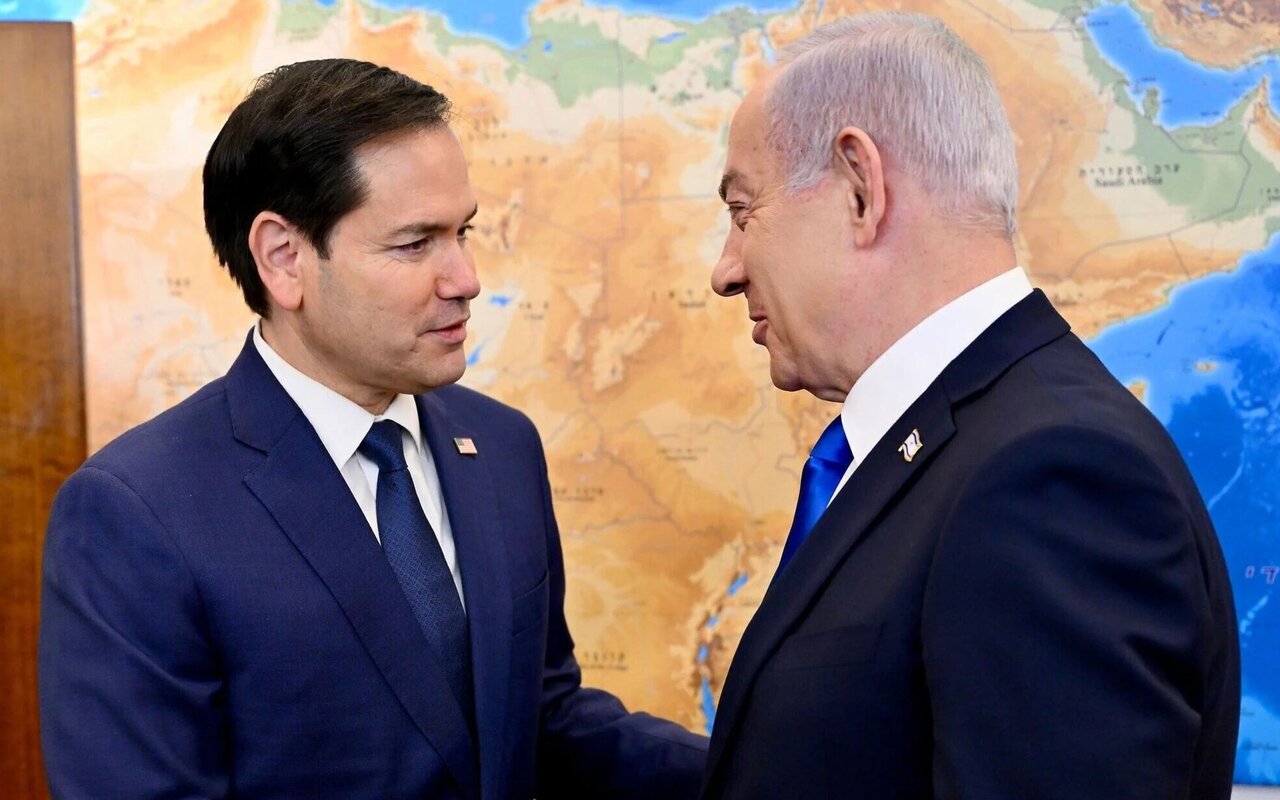Threats, threats, and more threats…
Rubio shows US has yet to come to its senses as he mimics Netanyahu’s war rhetoric

MADRID – Israeli Prime Minister Benjamin Netanyahu stated on Monday that Israel would "definitively resolve" the issue with Iran, with the backing of the United States. His remarks came after a meeting in the occupied al-Quds with U.S. Secretary of State Marco Rubio, in a context of growing tensions with Tehran.
Over the past 16 months, Israel has dealt “significant blows” to the Axis of Resistance, Netanyahu claimed in a joint press conference. According to the Israeli politician, under the "strong leadership" of Donald Trump and with Washington's "unwavering" support, Israel will be able to "finish the job."
Netanyahu described his meeting with Rubio as "very productive" and emphasized that Iran was the central topic of discussion. Both Israel and the United States, he stressed, share a coordinated strategy to prevent Tehran from acquiring “nuclear weapons”.
The U.S. Secretary of State reinforced this stance. "A nuclear-armed Iran will never happen. An Iran with nuclear capabilities that can shield itself from sanctions and external pressure is simply not an option," Rubio asserted. "President Trump has been clear on this matter," he added.
So far, the Trump administration’s approach has done little to dispel Tehran’s mistrust. The president’s reported alternatives don’t look any more promising eitherRubio’s visit to the occupied territories happened just a week after Leader of the Islamic Revolution Ayatollah Seyyed Ali Khamenei categorically ruled out any negotiations with the United States as long as Washington maintains its current "maximum pressure" strategy.
Iranian analysts, including Mostafa Nafaji, warn that this strategy is not purely political but also carries a military dimension, which could unfold in two phases. According to Nafaji, the first phase would see Israeli military threats complementing U.S. diplomatic and economic pressure, aiming to force Iran into negotiations on terms favorable to the West. This stage, expected to last around three months, would use military action as a tool to alter Tehran’s political stance.
If this initial phase fails to yield the desired results, the likelihood of a military strike on Iran’s nuclear facilities would increase. In this scenario, projected within three to nine months, Israel would take on a more active role in military escalation, with full U.S. support.
So far, U.S. and Israeli pressure has failed to shift Iran’s position, as reflected in the Leader’s recent statements. Adding to this, reports suggest that Washington has presented a list of demands far removed from Tehran’s expectations within the framework of negotiations, further diminishing the chances of reaching an agreement under current conditions.
The Trump administration’s approach has done little to dispel Tehran’s uncertainty. On one hand, the president and his team insist they are not seeking to destabilize the Iranian government and that their objective is to secure a nuclear deal rather than resort to military action. Trump’s recent statement that an agreement with Iran would prevent an attack on the country seemingly reinforces this position. However, at the same time, the White House has imposed new sanctions and maintains an ambiguous stance on Iran’s nuclear program.
This dual approach, combined with Iran’s deep distrust of Washington’s intentions, further complicates any prospects for renewed negotiations. In turn, it has led the Leader to adopt a more resolute stance in response to a combination of threats and inconsistencies from the United States.
Tehran insists that it is willing to negotiate, but without pressure and without being forced into making concessions on its nuclear program or other sensitive issues, such as missile development. However, the United States and the E3 countries (France, Germany, and the United Kingdom) may seek to exploit the current situation to push for an agreement requiring Iran to drastically dismantle its uranium enrichment infrastructure, aiming to keep it far from reaching the 90% enrichment threshold needed for military use.
In response to these demands, Iran asserts its legitimate right to develop nuclear technology. As a signatory of the Non-Proliferation Treaty (NPT) since 1968, Tehran argues that its nuclear program remains within the legal framework of the agreement and complies with international regulations. The Islamic Republic invokes Article IV of the NPT, which recognizes the right of all states to develop and share nuclear technology for peaceful purposes. At the same time, it dismisses accusations of pursuing a nuclear weapons program, noting that such allegations are part of a broader strategy to politicize technical issues.
Beyond the legal sphere, Iran’s nuclear policy is deeply tied to its revolutionary principles, including independence, self-sufficiency, and territorial sovereignty. From Tehran’s perspective, the country’s long history of foreign interventions has reinforced the need for an independent security and defense strategy, in which nuclear technology plays a crucial role.
Within this framework, Iran’s stance is also shaped by the fatwa issued in 2003 by Ayatollah Khamenei, which explicitly prohibits the development and use of nuclear weapons. However, a potential military attack on Iranian territory could strengthen the position of those within the government who advocate for revising this doctrine. Strategic circles in Iran emphasize that the country already possesses the technical capability to produce nuclear weapons and that the only deterrent factor is the Leader’s political decision.
For now, Ayatollah Khamenei appears determined to uphold his fatwa. Nevertheless, if Iran perceives an existential threat, its nuclear doctrine could undergo an unprecedented shift. There is also not guarantee that an attack on Iran’s nuclear sites would manage to destroy them, given their strategic and hardened positions under humongous mountains.
For the U.S., pressure and aggression is sure to lead it to a destination with Iran it was never pursuing in the first place.
Leave a Comment